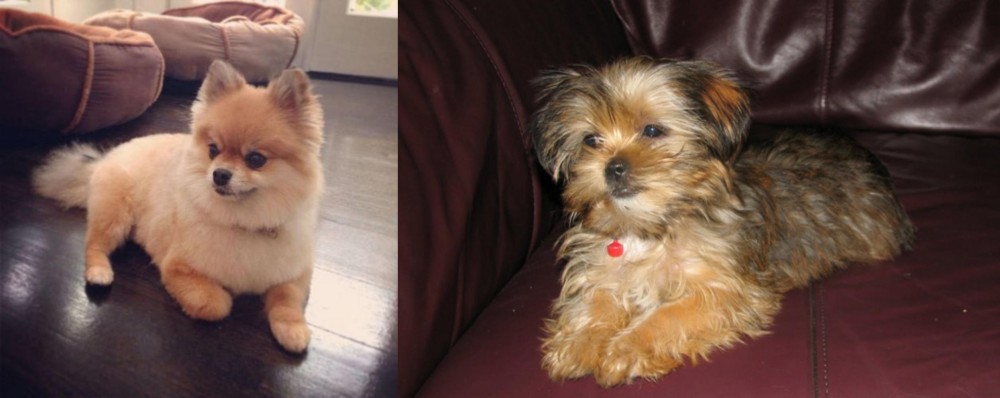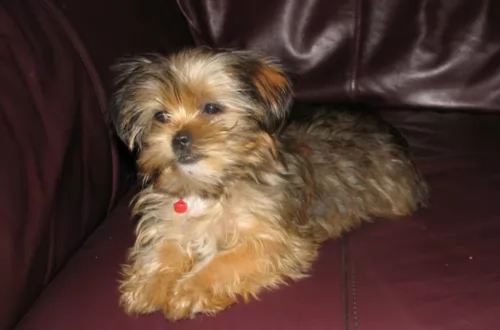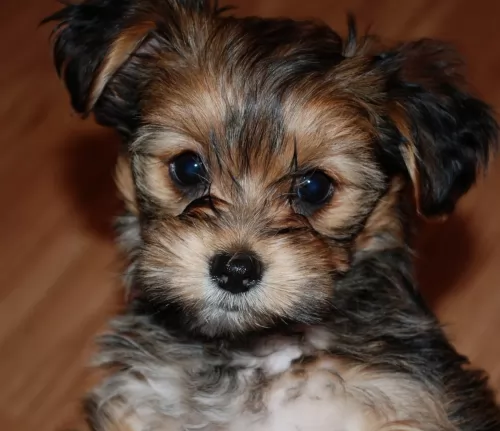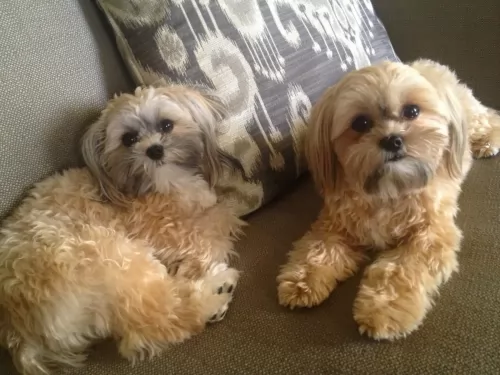 Petzlover
Petzlover Pomeranian is originated from Germany but Shorkie is originated from United States. Both Pomeranian and Shorkie are having almost same height. Both Pomeranian and Shorkie are having almost same weight. Both Pomeranian and Shorkie has almost same life span. Both Pomeranian and Shorkie has same litter size. Both Pomeranian and Shorkie requires Moderate Maintenance.
Pomeranian is originated from Germany but Shorkie is originated from United States. Both Pomeranian and Shorkie are having almost same height. Both Pomeranian and Shorkie are having almost same weight. Both Pomeranian and Shorkie has almost same life span. Both Pomeranian and Shorkie has same litter size. Both Pomeranian and Shorkie requires Moderate Maintenance.
 Pomeranian dog Known as the Pom and classified as a toy dog breed, the Pomeranian comes from the Spitz dog from the Arctic regions. It is thought that the dog is descended from larger Spitz-type dogs, and more specifically the German Spitz.
Pomeranian dog Known as the Pom and classified as a toy dog breed, the Pomeranian comes from the Spitz dog from the Arctic regions. It is thought that the dog is descended from larger Spitz-type dogs, and more specifically the German Spitz.
It appears to be an ancient dog breed because there are recordings of its existence from 1764 already. This little dog is thought to have got his name from the area known as Pomeranian in Northern Poland as well as along the Baltic Sea, Germany.
The first breed club for this dog was established in England in 1891. Not long afterwards the first breed standard was written. In the standard published in 1998, The Pomeranian Dog is categorized in the German Spitz standard.
 The Shorkie is a mix between a Yorkshire Terrier and a Shih Tzu. This little dog actually thinks he’s quite big. He is a great watchdog and a barker, and he is a loyal and loving member of his family. He will let you know if he thinks something is going on that shouldn’t be.
The Shorkie is a mix between a Yorkshire Terrier and a Shih Tzu. This little dog actually thinks he’s quite big. He is a great watchdog and a barker, and he is a loyal and loving member of his family. He will let you know if he thinks something is going on that shouldn’t be.
This hybrid combines two breeds known for their good looks, cuteness and personalities. Shorkies get their watchdog instincts and their loyalty to their people from the Shih Tzu and their personalities and good looks from the Yorkie. This designer breed has no known standard and every puppy is different, but traits from its founding breeds will remain. Both breeds have great personalities.
Regardless of the differences within the litter, because the personalities and adorableness of the two founding breeds are equal, all of the puppies will have those characteristics. They will all be energetic, playful and think they are big dogs. They will all love people and especially kids – playing and watching over them.
The Shorkie is intelligent, trainable, and snuggly. They will also have the stubborn trait that the two founding breeds can show at times. Developed in the United States, this crossbreed is extremely popular even though they have been in existence for only ten years or so. Breeders in the U.S. began to mix these two breeds in order to develop a cute, friendly and intelligent little dog that will cuddle on your lap – perfect lap dog.
Even if we already have breeds similar to the Shorkie, its development allows breeders to diversify and improve the genetics of the dogs. It is important that these be responsible breeders whose intentions are not financial but to legitimately improve the positive traits of each breed while sorting out the undesirable or weak traits. This is the positive side of the new designer breeds.
Even though it is still being developed, at least the Shorkie seems to be a success story for designer breeds as a loving, popular little dog. It will take a lot more time and a lot more development before the Shorkie becomes an actual recognized breed. At the moment it remains a hybrid, a crossbreed, a so called designer dog.
It will be at least 7-10 generations of careful and quality breeding before the Shorkies are potentially recognized as its own pedigree breed. It is important to breed Shorkies to Shorkies in order to develop a standard that could be accepted for a new breed by the AKC and UKC. Over time the puppies must become more and more standardized in their conformity to that new breed standard. Their physical appearance and their temperament will be standardized. At this stage the second generation of Shorkies is rare. Their popularity is rising in the United Kingdom. Both Britain and Ireland have a growing interest in this hybrid.
 This is such a sweet little dog, full of good cheer and with such a bright little face. He weighs between 1.5kg and 4kg and stands at anything between 17 and 28cm in height.
This is such a sweet little dog, full of good cheer and with such a bright little face. He weighs between 1.5kg and 4kg and stands at anything between 17 and 28cm in height.
He is such a compact little fluff ball with sharp erect ears and a fox like appearance with a well feathered tail that curls up over the dog’s back.
The coat is thick and spritely, not lying flat but standing up around the dog. Coats can be nearly any color, but the most common is tan, reddish, orange or you get a mix of cream tan and black.
When you look into the bright little face of the Pomeranian Puppy, you can see that he is a true extrovert. He is social and has a huge personality. They’re bright, eager, feisty, loving and loyal.
Full of fun and very intelligent, they may be small and cute, but training and socialization will do him the world of good as it means you can take him anywhere with you and he’ll be well behaved. They grow attached to their owners and want to protect them.
They can be somewhat aloof with strangers and its this wariness around them that makes them good watchdogs. They get on well with children in the home and are prepared to make friends with other pets in the family too.
 The Shorkie, being a cross between the Yorkshire Terrier and the Shih Tzu, and as such has physical and temperament characteristics from both breeds. They could be 50-50 but most likely each puppy will be more like one of the founding parents than the other. Because there is a lot of similarity between the founding breeds there is a lot of similarity between the Shorkies.
The Shorkie, being a cross between the Yorkshire Terrier and the Shih Tzu, and as such has physical and temperament characteristics from both breeds. They could be 50-50 but most likely each puppy will be more like one of the founding parents than the other. Because there is a lot of similarity between the founding breeds there is a lot of similarity between the Shorkies.
Their hair is either wavy or straight, but it is soft. It can be a wide variety of colors and usually they have a darker mask on the face. Usually they have the eyes of the Shih Tzu – large -but not protruding. Their muzzle is short, and the skull is round with triangle ears. Their bodies are compact, small with plenty of muscle for their size. They also have fine bones and short legs, with a thin curled tail.
 Pomeranians are such bright, friendly little dogs and they’re also active. These loving dogs are also intelligent so you can easily teach him some simple commands such as sit or lie down.
Pomeranians are such bright, friendly little dogs and they’re also active. These loving dogs are also intelligent so you can easily teach him some simple commands such as sit or lie down.
He won’t want to lie down for too long though because he’s full of beans.
He’s alert too so he makes a good watchdog. When you bring one of these dogs into your home as a pet and companion animal, you won’t be disappointed as he’s got a whole lot of love to give.
 Your little Pomeranian Puppy is a sturdy dog who isn’t going to battle too much with health issues. With good care such as good food and exercise, the Pomeranian can reach 12 – 16 years of age.
Your little Pomeranian Puppy is a sturdy dog who isn’t going to battle too much with health issues. With good care such as good food and exercise, the Pomeranian can reach 12 – 16 years of age.
Some of the most common health issues you might come across
This problem comes about when the ridges which form the patella groove in the knee aren’t deep enough to allow the patella to sit securely. This causes the patella to move out of the groove. While the muscles are contracted, the patella isn’t able to return to the correct position.
Pomeranians Dogs are prone to quite a few eye problems such as tear duct problems and cataracts. As a responsible dog owner, take your pet to the vet if you suspect eye problems.
The trachea carries air to the lungs and it can collapse. Your dog will have a chronic, dry cough and this can be brought about when people tug on their dog's leash.
Every little dog battles with teeth and gum problems which can lead to early tooth loss. When you brush your Pomeranian, make a point of checking inside his mouth too, as a bad tooth can cause pain but also all kinds of health problems.
 Many hybrids are in better health at least genetically than their parent breeds. Responsible breeders will breed any genetic issues out of their puppies. Still there are many health issues that the Shorkies are prone to. These include:
Many hybrids are in better health at least genetically than their parent breeds. Responsible breeders will breed any genetic issues out of their puppies. Still there are many health issues that the Shorkies are prone to. These include:
• Brachycephalic Airway Syndrome – “smashed face” causes problems with breathing, heat, flying and more.
• Glaucoma – Yorkshires have this, and it can be secondary to the lens Luxation.
 Pomeranians Dogs have a thick, double coat, so you will need to invest in a decent brush so that you can brush him. He is a shedder so this is an important part of grooming. Some people prefer to take the dog to the groomers and have the coat professionally cut.
Pomeranians Dogs have a thick, double coat, so you will need to invest in a decent brush so that you can brush him. He is a shedder so this is an important part of grooming. Some people prefer to take the dog to the groomers and have the coat professionally cut.
Your cute little Pomeranian isn't the kind of dog to spend too much time asleep on the couch. He is energetic and full of beans and he will wait anxiously for you to take down his leash and take him on a walk. In indoors his bright little face will be watching yours to see if there’s any chance of a ball game.
People never know if they should feed their dogs dry kibble, semi-moist or canned dog food. Homemade food is always good, but if you opt to also use commercially manufactured dog food, go for the good quality ones that have vitamins and minerals in them.
Every dog needs a good balance of protein, carbs, minerals, fats, vitamins and trace elements. People often get all worked up over feeding their pets when it can be so simple.
Use a high quality dry kibble, but now and then add some home-made cooked food into it as a treat – about once or twice a week. Boil some chicken, brown rice, sweet potato, carrots and spinach and add this in to the dry kibble.
Every now and then a little bit of raw meat will also do your pet the world of good. What could be more simple than this? Nutritious, tasty and healthy, and your pet will thrive on it.
Make sure he always has a bowl of fresh, cool water close by.
 1.Feeding the puppy - The Shorkies need a high-quality, well-balanced dry kibble. Make sure it is a formula for small, active dogs. It should have lean meat and essential minerals and vitamins. Make sure it is puppy food not adult. The puppy needs 300 -550 calories a day in 3 meals.
1.Feeding the puppy - The Shorkies need a high-quality, well-balanced dry kibble. Make sure it is a formula for small, active dogs. It should have lean meat and essential minerals and vitamins. Make sure it is puppy food not adult. The puppy needs 300 -550 calories a day in 3 meals.
2.Feeding the adult – Obesity is a problem for the Shorkie as it is for many small dogs. Don’t overfeed your adult but give her the same kind of high quality small breed dog food, only for adults. They need about 200-300 calories a day in 2 meals.
4. Games and Exercises – These are very active little dogs and need exercise every day. They needs walks, games, and time with you. They also love to cuddle with you at the end of the day. They love squeaky toys and playing fetch outside or inside.